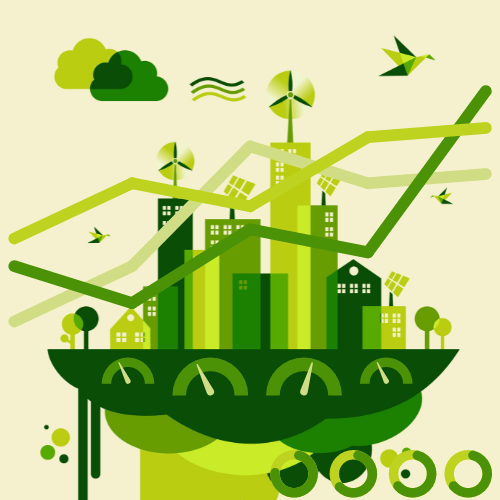Professional Services

Key IT technologies for the smart city
Data-based techniques and modern information technology (IT) are crucial for the development and management of distributed, autonomous neighbourhood farms in the city. They provide the necessary tools to make the operation of such farms efficient and maximise their impact on the sustainability of the city. This chapter presents the most important IT technologies and concepts relevant to this sector.
New technologies, individually or in combination, can significantly improve the efficiency and sustainability of distributed, autonomous neighbourhood farms. They enable data-driven, precision agriculture that can respond to the specific needs and conditions of each individual farm. They can also help strengthen the connection between consumers and their food by increasing transparency and traceability. By utilising these technologies, cities can build a more sustainable, resilient and healthy food system.
Data-based technologies and agile software development are becoming important tools for sustainable urban development.
Data-driven techniques are about collecting, analysing and using data to support decision-making and policy formulation. For example, it can be data on energy consumption, waste generation, water consumption, traffic behaviour and other factors relevant to sustainability. This information can be used to identify problems, track the progress of sustainability initiatives and develop new strategies.
An example of how data can be used is information on hydroponics and solar panels. Data on hydroponics can provide information on ideal growing conditions, resource utilisation and food yields, increasing the efficiency and production of these systems. Similarly, data from solar panels can be used to improve energy yield and consumption.
In parallel, agile software development can help enable data-driven sustainability. Agile techniques emphasise adaptability, collaboration and customer satisfaction. Agile software solutions can provide the necessary tools for data collection, analysis and visualisation. They enable real-time monitoring of sustainability indicators, predictive analyses to guide future actions and efficient resource management.
A concrete application example of agile software development would be a software system for the management of a city's hydroponics. Such a system could monitor plant growth in real time, automate the control of lighting and irrigation systems and provide data-based insights to increase crop yields and resource efficiency. In addition, agile software solutions can help communities engage in sustainability projects. They can serve as venues for information sharing, collaboration and critique, encouraging community members to feel responsible and involved.
Farmlyplace is an example of a company that uses data-driven techniques and agile software development to promote sustainable food production. Their strategy includes implementing and educating about the best platforms for food production and developing food production services for the future decentralised and sustainable food system.
A concrete project of Farmlyplace is the Farmlyledger app, which was developed to implement the food miles paradigm. Food miles, the distance a food product travels from production to the consumer, are a method of demonstrating the environmental impact of transporting food and the benefits of buying local produce. The Farmlyledger app aims to create transparency about the origin and journey of food and can therefore help consumers make more informed purchasing decisions and favour local produce to reduce transport distances and associated carbon emissions.
Farmlyplace also operates other franchises and brands such as kiezfarm.org, foodinthecity.de and krauTThai.de, all of which focus on innovation and technology. These projects enable households and groups to enjoy fresh, healthy and locally grown vegetables all year round, supporting sustainable food systems in their communities.
In summary, data-driven techniques and agile software development have the potential to dramatically improve the implementation and effectiveness of urban sustainability policies. They can help make cities more sustainable, resilient and liveable by giving us the tools to study, manage and improve our urban environment.
Internet of Things (IoT)
IoT devices such as sensors and actuators play a crucial role in autonomous neighbourhood farms. They enable continuous monitoring and control of growing conditions such as temperature, light intensity, soil moisture and nutrient levels. By connecting these devices to wireless networks, farmers and farm managers can access this data in real time and make adjustments as needed.
Big Data und and Analytics
The data collected on the farms must be analysed and interpreted in order to make informed decisions. Big data technologies and data analysis tools can help to recognise patterns and trends, make predictions and develop strategies for farm operations. They can also help to optimise resource consumption and increase productivity.
Agile Software Development
Agile methods can be used to develop customised software solutions for the operation and management of urban farms. They make it possible to react quickly to changing requirements and conditions and achieve continuous improvements. Agile software solutions can support functions such as data collection, analysis and visualisation, monitoring of sustainability indicators, predictive analytics and resource management.
Artificial Intelligence (AI) und Machine Learning (ML)
AI and machine learning technologies can be used to recognise complex patterns in the data collected and make predictions. They can also help with the automation of processes, from irrigation and fertilisation to pest control.
Blockchain-Technology
Blockchain technology could be useful for decentralised farms spread across the city, particularly in terms of transparency and traceability. For example, it could be used to keep accurate records of the origin of food and its journey from the field to the consumer.
Mobile Apps and Cloud Computing
Mobile apps can enable farmers, managers and consumers to access information, place orders or even check the condition of their crops in real time. Cloud computing can help reduce the cost of data storage and processing and enable access to data and services from anywhere.
Transform Urban Spaces with Expertise
Partner with Farmlyplace for Your Urban Farming Projects
Get Professional Assistance
Leverage our extensive knowledge and innovative solutions to create impactful urban farming initiatives. Join us in shaping the future of urban agriculture.
